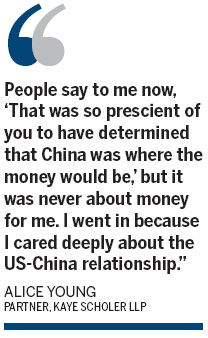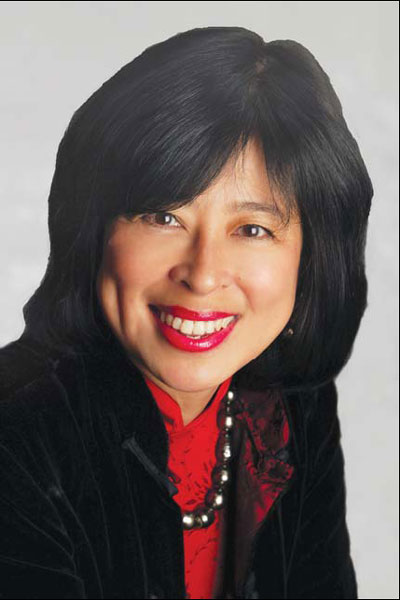Lawyer a pioneer in bridging cultural divides
Updated: 2012-06-15 10:49
By Kelly Chung Dawson in New York (China Daily)
|
||||||||
|
Alice Young. Provided to China Daily |
When Alice Young was accepted in 1969 to Yale University's first graduating class of women, the United States was fighting the Vietnam War. She was a "double minority" at a time when neither status felt entirely comfortable - her class was only 10 percent female, and Young was one of only nine Asian-Americans among 1,100 freshmen.
"It was a truly pioneering time for everyone, but for me it was an opportunity," she told China Daily. "What was really important to me was to somehow be a cultural bridge.
"I felt as if on the one hand, I really understood what it was to be American. But on the other hand, I could also relate to being considered a foreigner, even though I was born and raised in the US. I was constantly translating who I was, what being Asian-American or Asian was, and what it might mean."
Young, who is now a partner at Kaye Scholer LLP in New York and head of the law firm's Asia-Pacific practice group, has made a career of bridging that cultural divide. She has led projects on the Chinese mainland and in Hong Kong, Taiwan and other places across a range of legal specialties including joint ventures, mergers and acquisitions, finance, investment and trade.
As lead counsel to Pfizer, Kaye Scholer successfully defended the validity of the pharmaceutical giant's Chinese patent for Viagra before China's State Intellectual Property Office, she said. Young worked with Pfizer's local Chinese lawyers to identify key evidence and prepare arguments for hearings in Beijing.
Her firm also assisted Haier Group when it entered the US market and successfully represented China Minmetals Corp in a highprofile US derivatives lawsuit. In 1979, Young was one of the first American lawyers to go to China, representing cosmetics giant Revlon. Immediately, Chinese business associates felt more comfortable with her because of her language skills and appearance, she recalled.
"I feel so privileged to have been able to go in as a lawyer early on and then be part of all these changes over nearly four decades," Young said.
"People say to me now, 'That was so prescient of you to have determined that China was where the money would be,' but it was never about money for me. I went in because I cared deeply about the US-China relationship.
"It's always been about helping people and businesses solve a problem, or figuring out how to work together. Being able to translate not just the legal terminology but also the cultural, political and socioeconomic considerations, that's what to me has been my strongest ability: to not assume that what's happening today is the entire story."
As the daughter of a Chinese diplomat-turned-professor, Young grew up in Washington, DC, and Virginia, where the Youngs were the only Asian family in their community. When her father took a job in Japan, the family lived on a predominantly white US military base. Later she spent her high school years in Hawaii, where the population was 70 percent Asian American.
"From the beginning I lived in these vastly different, opposed worlds," she said. "At some point I started thinking, 'Who am I? Where do I fit?' I wasn't fully Chinese, but people treated me like I wasn't fully American either. All of my life I've had to adapt to my surroundings, so I learned to just change gears. As a result, I think I have a tremendous eye and ear for other cultures and languages."
At Yale, Young and a few others founded the Asian American Students Alliance, an organization that still exists. Later, at Harvard Law School, she made the decision to focus on Asia.

"At the time, no one was interested in Asia, quite frankly," the lawyer said. "But I decided that with my interests and cultural background and language ability, Asian law practice was something I should pursue. I felt that if you were forced to learn a language, and you were forced to put yourself in someone else's culture and shoes, that you would become much better attuned to the differences and to be able to bridge the similarities. I decided that was really important to me."
With Asia's growing economic stature, there is an "obvious business value" to understanding Asian perspectives today, she said.
"If you understand how people think, you have a much greater chance at success in doing business with them," she said. "But going a little bit deeper than that, I think we as Americans tend to have a very America-centric approach.
"One out of every five people in the world is Chinese, and the fact that here in the US we continue to think that English is going to remain the dominant language of even the Internet is a huge mistake. It really behooves us to have a better understanding of what the differences are and how to make it work long-term. That is what I do as a lawyer."
A common misstep Americans make toward China is to regard it as a "monolithic country," Young said. "I see tremendous differences between the generations in China. I think for every one generation here in the US, it's almost as if there's a 1.5 generation gap in China. And there are huge differences within the different regions of China as well, so when people say, 'The Chinese people think like this,' I find it ridiculous."
The pace of change in China is so rapid that Western books about doing business there become obsolete within a few months of publication, said Young, who travels frequently to Kaye Scholer's Shanghai office and calls daily to keep updated.
There are great opportunities for Americans going into China, but also for Chinese investing in the US, she said.
At a recent meeting organized by the Council on Foreign Relations in New York, Young spoke to a group of the 30 most successful business entrepreneurs in China.
"There are just as many mistakes Chinese companies can make moving into the US as there are when Americans go into China," she recalled saying to the group. "I think it's important for Chinese coming to the US to look beyond the rhetoric. There are socioeconomic and political sensitivities in the US such as unemployment, the Foreign Corrupt Practices Act and CFIUS [Committee on Foreign Investment in the US], so Chinese companies should be careful in how they approach the American market.
"Rather than just coming in and putting people in managerial positions who don't have a sensitivity to the issues here, it's always better to go in with a toehold, and good legal and business advisers, to understand the culture and business and expand slowly. So many mistakes are made where there's a rush to go in and spend money, and to Americans it can feel like an 'invasion' of sorts. It's very important to think through those details in bridging the cultural differences."
In addition to her legal work, Young is active in the Asian-American community. She is involved with the Asian American Legal Defense and Education Fund - it presented her with its Justice in Action Award in 2004 - and is a member of the prestigious Committee of 100. She is a trustee of the Aspen Institute, the Asia Foundation and Give2Asia; has been chairwoman of the Deloitte & Touche Diversity Advisory Board; and served on the Council on Foreign Relations' life membership committee, the National Committee on USChina Relations and the US-China Business Council.
She is also passionate about mentoring young professionals, she said.
"I've always wanted to do good, not just do well," she said. "Since I was in high school and in college, I always wanted to make things better in the world. I hope to keep learning and teaching. I love the fact that I've got my feet and my heart in so many different worlds."
kdawson@chinadailyusa.com

 Relief reaches isolated village
Relief reaches isolated village
 Rainfall poses new threats to quake-hit region
Rainfall poses new threats to quake-hit region
 Funerals begin for Boston bombing victims
Funerals begin for Boston bombing victims
 Quake takeaway from China's Air Force
Quake takeaway from China's Air Force
 Obama celebrates young inventors at science fair
Obama celebrates young inventors at science fair
 Earth Day marked around the world
Earth Day marked around the world
 Volunteer team helping students find sense of normalcy
Volunteer team helping students find sense of normalcy
 Ethnic groups quick to join rescue efforts
Ethnic groups quick to join rescue efforts
Most Viewed
Editor's Picks

|

|

|

|

|

|
Today's Top News
Health new priority for quake zone
Xi meets US top military officer
Japan's boats driven out of Diaoyu
China mulls online shopping legislation
Bird flu death toll rises to 22
Putin appoints new ambassador to China
Japanese ships blocked from Diaoyu Islands
Inspired by Guan, more Chinese pick up golf
US Weekly

|

|







